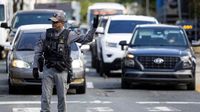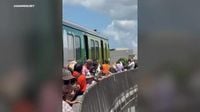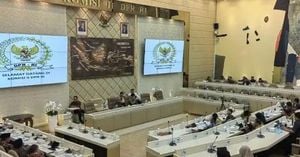A massive power outage hit Puerto Rico on Wednesday, April 16, 2025, leaving all 1.4 million customers on the island without electricity as they prepared for the Easter weekend. The blackout, which began around 12:40 p.m. local time, was attributed to the unexpected shutdown of energy plants across the island, including both public and private generators.
Hugo Sorrentini, a spokesman for Luma Energy, the company responsible for power transmission and distribution, confirmed that "the entire island is without generation." This sudden disruption has prompted widespread frustration among residents, many of whom were looking forward to the Easter celebrations, a significant holiday for the largely Catholic population of Puerto Rico.
At least 328,000 customers were also reported to be without water, compounding the challenges faced by families during this critical time. With hotels at near-capacity due to the influx of tourists for the holiday, officials moved quickly to reassure visitors that many establishments were operating on generators. Despite these efforts, the situation remained dire, with officials warning that power restoration could take between 48 to 72 hours.
Josué Colón, the island's energy czar, expressed his anger at the situation, stating, "This is unacceptable." He, along with other officials, has faced mounting pressure from residents who are demanding accountability and improvements in the power infrastructure. Many locals echoed these sentiments, with Orlando Huertas, 68, lamenting, "This is a total disaster," as he enjoyed a drink at a bar.
The outage has affected various aspects of daily life on the island. Traffic snarled as police were deployed to manage busy intersections, and many businesses, including the largest mall in the Caribbean, were forced to close. Professional sporting events, including baseball and basketball games, were canceled, leaving fans disappointed.
By late Wednesday afternoon, Luma Energy reported that approximately 5,000 to 7,000 customers had their power restored, although this number was expected to fluctuate as crews worked to stabilize the grid. Those without generators flocked to grocery stores to purchase ice and other essentials, with residents like Carmen Suriel expressing desperation over the situation. Suriel, who has two young children, including a six-month-old, worried about the heat and the lack of power for essential appliances.
The power crisis in Puerto Rico is not new. The island has struggled with chronic outages since Hurricane Maria devastated its power grid in September 2017. The infrastructure had already been deteriorating for years due to inadequate maintenance and investment. The last major blackout occurred on New Year's Eve, when approximately 1.2 million customers lost power, taking two days for crews to restore service.
In response to the ongoing crisis, Verónica Ferraiuoli, Puerto Rico's acting governor and secretary of state, stated that the White House had reached out to local officials and was available to assist if necessary. Meanwhile, Daniel Hernández, vice president of operations at Genera PR, explained that a disturbance affected the transmission system shortly after noon on April 16. This incident occurred during a vulnerable time for the grid, which lacks sufficient frequency regulation.
As the situation unfolded, the Luis Muñoz Marín International Airport operated on generator power, with limited services available. Airport officials reassured passengers that flights were operating normally and urged them to arrive early. Hospitals on the island were also relying on generators to maintain operations, highlighting the critical nature of the situation.
Despite the federal government's previous support in providing resources to rebuild the power grid, experts are concerned that the current administration under President Donald Trump may not prioritize these efforts. Approximately 117,000 homes and businesses on the island have solar rooftops, but the majority of the island's power—62%—still comes from petroleum-fired power plants, with natural gas providing 24%, coal 8%, and renewables only 7%, according to the U.S. Energy Information Administration.
Pablo José Hernández, Puerto Rico's representative in Congress, vowed to work diligently to ensure that Washington understands the urgent situation residents face daily. He emphasized that access to reliable electricity is a basic right that many Americans take for granted, yet remains out of reach for millions in Puerto Rico. Congressman Ritchie Torres echoed this sentiment, calling the ongoing electric grid crisis a "national disgrace."
As Puerto Rico continues to grapple with the fallout from this latest outage, residents are left wondering when lasting solutions will be implemented to address the chronic power issues that have plagued the island for years. The Easter weekend, typically a time of celebration and family gatherings, now looms as a stark reminder of the fragility of Puerto Rico's power infrastructure and the urgent need for reform.






